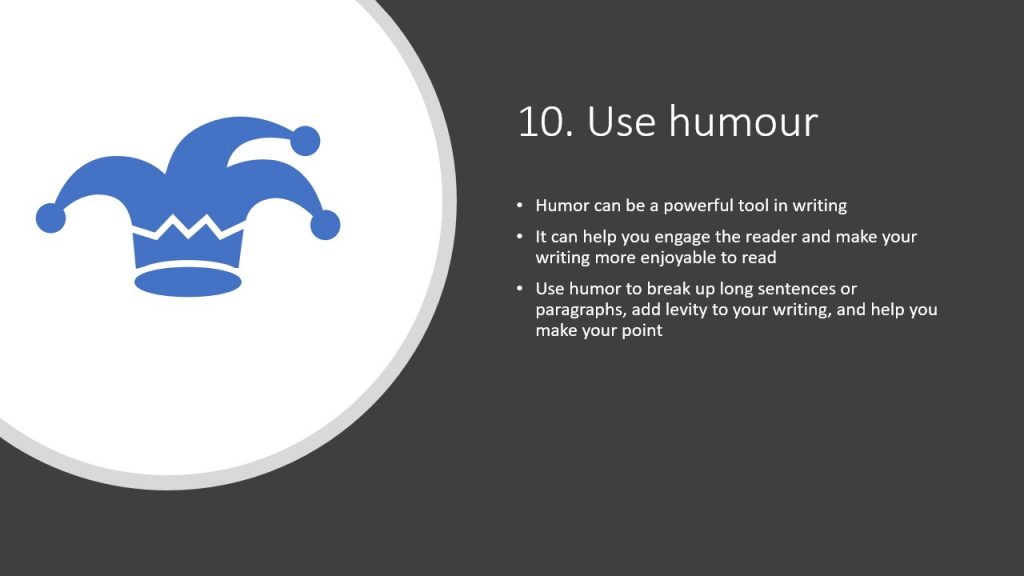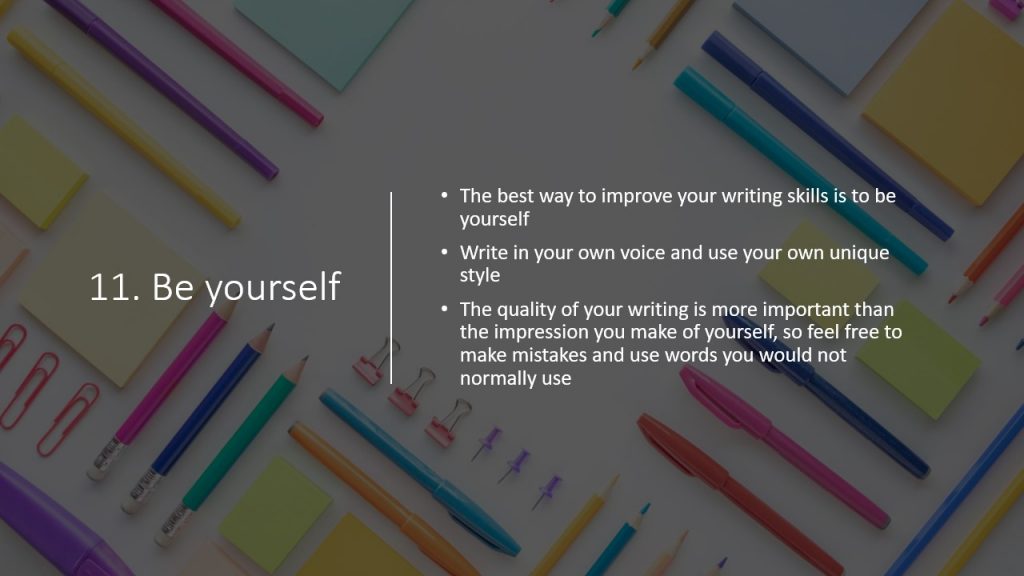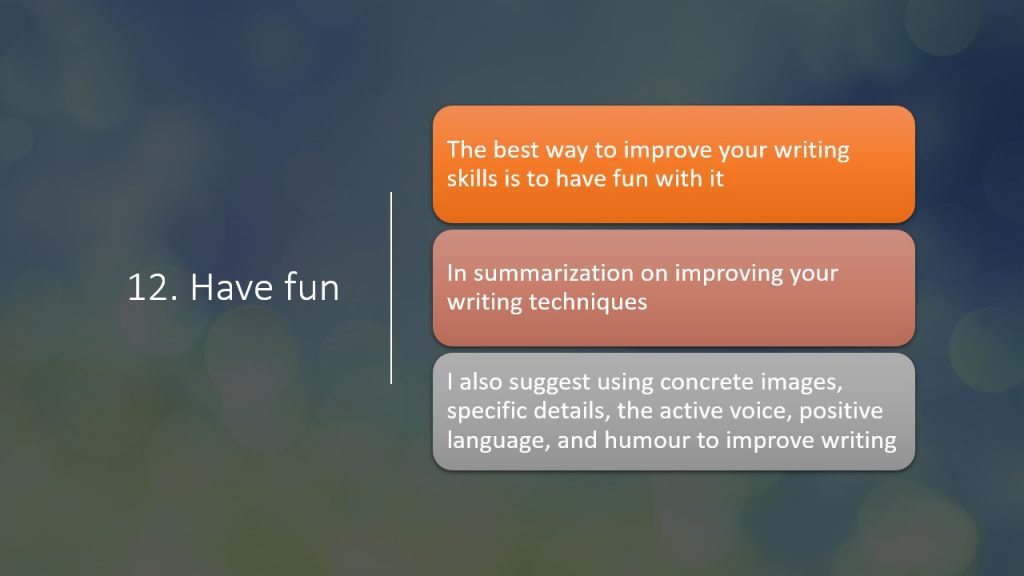How to Become a Better Writer
Are you an author? The need for writers in today’s online economy is enormous, but the competition is fierce, so you will want to be the best writer you can be. Here are twelve techniques to improve your writing skills. Why don’t you give them a shot?
1. Write every day.
This is the most efficient method to enhance your writing skills. The more you write, the better you will get. Your target is to write one page every day. Not good enough? Try to write more, try to write more every day. One page is enough if you have nothing to say, or if you want to improve your writing. Just one page, even two pages are enough to get your blood running.
However, if you are prepared to write more, then great! Go for it! When you want to write more, you must plan. You must know how much you will write and how much you will write every day.
To do this, I suggest using Pomodoro Technique. You should use your everyday life or a phone timer app. I use the Rescue Time app for android. It is especially useful for me. Every time you want to write, just start the timer.
When the timer rings, take a short break and do something else. I usually do some exercises or read. You can play on the internet or watch TV. After a few minutes, you can start to write again.
This is my effortless way of writing. I recommend you do the same.
2. Read a lot.
Reading helps improve your vocabulary and gives you a better understanding of grammar and syntax. Plus, it improves your vocabulary. Read over three novels in a month – any novel, though you cannot choose the genre of the book. It is important to pick a novel that is out of the norm – that is the most interesting to you.
Read fiction, non-fiction, articles – even newspapers and magazines! You should try to read something at least a few times every week. Take notes. In fact, take a lot of notes. I use the Notes application on my phone. Some people use Scrivener or InDesign, and some just write it all down on paper, but one thing is for sure: take notes.
3. Use strong verbs.
Do not be afraid to use verbs that express action and movement. They make your writing more vivid and engaging. However, avoid verbs that simply describe movement such as, “kicked,” or “ran.” Make sure your verbs make sense.
Whether they are long or short words, your verbs must be clear, direct, and vivid. Make sure they are the right words for the action you are describing and use the same verb consistently. Do not lump words together that could make your storey confusing, such as “slammed” and “thrown.”
Reduce repetitiveness.
Avoid verbs that sound the same, particularly the passive. Make sure you include action verbs that express movement.
Do not forget the adverb.
Adverbs are particularly important in crafting action verbs. For example, “kicked” is passive, but “kicked” looks more active and more intense. Be sure your adverbs are meaningful and purposeful.
4. Use concrete images.
When possible, use concrete images in your writing instead of abstract ones. They said the reader in comprehending what you are attempting to communicate. It also saves a lot of typing.
5. Use specific details.
Including specific details in your writing helps the reader get a better understanding of what you are trying to say. In other words, using specific details gives your reader a more concrete image of what you are trying to talk about.
6. Be clear and concise.
Do not use more words than necessary. Be clear and concise in your writing and you will be sure to make an impression. Your audience wants you to be clear and concise. Make it easy for them to absorb what you have to say.
7. Be concise in your sentence structure.
In addition to being concise in your words, be concise in your sentence structure. Use short, simple sentences whenever possible. I am not talking about the long, convoluted sentences that make you think to yourself, I am talking about the short, clipped, simple sentences that make you think, “Wait, what?”
How much more difficult do you want a reader’s task to be?
8. Use the active voice.
The active voice has a stronger and more direct tone than the passive voice. It makes your writing more engaging and dynamic. The passive voice puts emphasis on the agent of an action and not the action itself. It uses forms of being rather than the doer of the action. The active voice puts emphasis on the do-er of the action. The active voice is easier to read and understand. The active voice is better for writing persuasive and effective sentences. Writing in the active voice can help with fluency.
9. Use positive language.
Use positive language in your writing to create a positive tone and mood.
Use emotional words. Instead of using words like “try” or “sorry” try using words like “triumph,” “joy,” and “surprised.” Use words like love, hate, thank, and laugh.
Use positive language.
The use of positive language is especially important when writing to others. The tone and mood are especially important. Writing with positive language will help the reader feel your attitude and emotions, and it will put them in a good mood too.
10. Use humour.
Humour can be a powerful tool in writing. It can help you engage the reader and make your writing more enjoyable to read. Use humour to break up long sentences or paragraphs, add levity to your writing, and help you make your point. Be playful with your writing.

11. Be yourself.
The best way to improve your writing skills is to be yourself. Write in your own voice and use your own unique style. This means not judging yourself for making mistakes or using words you would not otherwise use. The quality of your writing is more important than the impression you make of yourself, so feel free to make mistakes and use words you would not normally use. If you are writing what is in your heart, do not let anyone influence you from writing how you are used to writing.

12. Have fun.
The best way to improve your writing skills is to have fun with it. Write about topics that interest you and experiment with different writing styles, even experiment with different font sizes, sentence lengths, and styles. Try writing in short or long. Try writing with blank or with a pen and paper. Whatever works for you. Just enjoy yourself.

In Summary
In summarization on improving your writing techniques. I recommend twelve techniques to improve writing skills, including writing every day, reading a lot, using strong verbs, and being concise.
I also suggest using concrete images, specific details, an active voice, positive language, and humour to improve writing. Finally, I recommend having fun with writing.
Overall, this article provides a number of useful tips for improving writing skills.
Thanks for reading


Leave a Reply